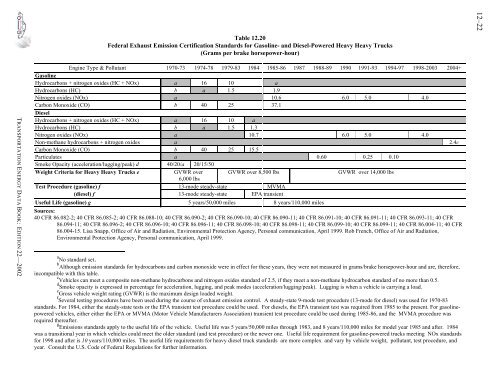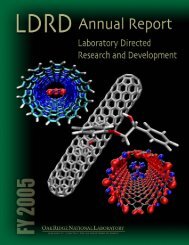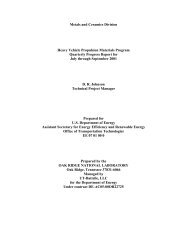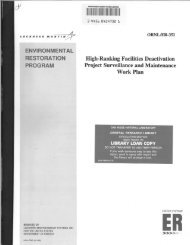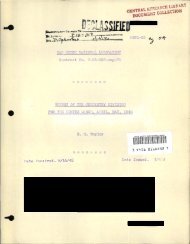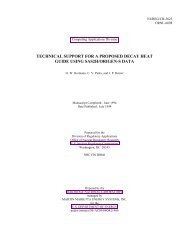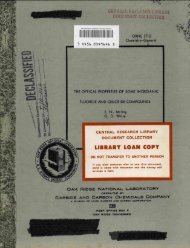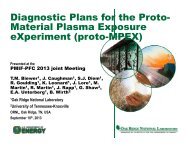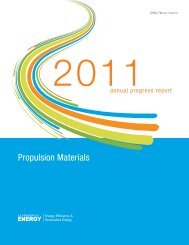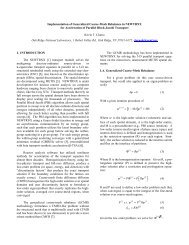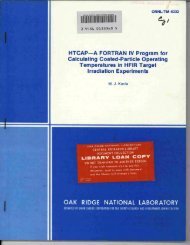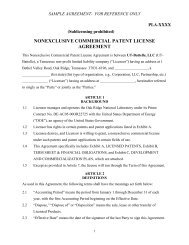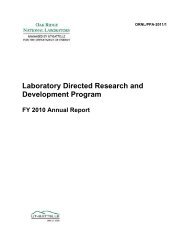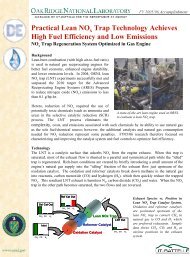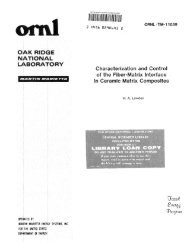- Page 1 and 2:
Center for Transportation Analysis
- Page 3:
Users of the Transportation Energy
- Page 6 and 7:
vi TABLE OF CONTENTS (Continued) Ta
- Page 8 and 9:
viii TABLE OF CONTENTS (Continued)
- Page 10 and 11:
x TABLE OF CONTENTS (Continued) Tab
- Page 12 and 13:
xii TABLE OF CONTENTS (Continued) T
- Page 14 and 15:
xiv TABLE OF CONTENTS (Continued) T
- Page 16 and 17:
xvi TRANSPORTATION ENERGY DATA BOOK
- Page 18 and 19:
xviii TRANSPORTATION ENERGY DATA BO
- Page 20 and 21:
xx TRANSPORTATION ENERGY DATA BOOK:
- Page 22 and 23:
xxii TRANSPORTATION ENERGY DATA BOO
- Page 24 and 25:
xxiv TRANSPORTATION ENERGY DATA BOO
- Page 26 and 27:
1-2 Although the world has consumed
- Page 28 and 29:
1-4 This table shows petroleum prod
- Page 30 and 31:
1-6 Figure 1.2. World Oil Reserves,
- Page 32 and 33:
1-8 Total OECD government-owned pet
- Page 34 and 35:
1-10 The share of petroleum importe
- Page 36 and 37:
1-12 Estimates of military expendit
- Page 38 and 39:
TRANSPORTATION ENERGY DATA BOOK: ED
- Page 40 and 41:
1-16 Most of the petroleum imported
- Page 42 and 43:
1-18 Millions of Barrels per Day Th
- Page 44 and 45:
1-20 Pipelines accounted for two-th
- Page 46 and 47:
2-2 Petroleum accounted for 40% of
- Page 48 and 49:
2-4 The Energy Information Administ
- Page 50 and 51:
2-6 As data about alternative fuel
- Page 52 and 53:
2-8 The highway sector is by far th
- Page 54 and 55:
2-10 The use of diesel for off-high
- Page 56 and 57:
2-12 Nearly all of the fuel ethanol
- Page 58 and 59:
2-14 Great care should be taken whe
- Page 60 and 61:
2-16 Figure 2.2. Energy Intensities
- Page 62 and 63:
2-18 Great care should be taken whe
- Page 64 and 65:
2-20 Nearly all of the fuel ethanol
- Page 66 and 67:
2-22 Great care should be taken whe
- Page 68 and 69:
2-24 Figure 2.2. Energy Intensities
- Page 70 and 71:
2-26 Great care should be taken whe
- Page 72 and 73:
Source Chapter 3 All Highway Vehicl
- Page 74 and 75:
TRANSPORTATION ENERGY DATA BOOK: ED
- Page 76 and 77:
TRANSPORTATION ENERGY DATA BOOK: ED
- Page 78 and 79:
The data on automobile and light tr
- Page 80 and 81:
TRANSPORTATION ENERGY DATA BOOK: ED
- Page 82 and 83:
The average age of automobiles was
- Page 84 and 85:
Using current registration data and
- Page 86 and 87:
Using current registration data and
- Page 88 and 89:
Using current registration data and
- Page 90 and 91:
Chapter 4 Light Vehicles and Charac
- Page 92 and 93:
The Federal Highway Administration
- Page 94 and 95:
Over one-quarter of autos sold in 2
- Page 96 and 97:
The sales-weighted fuel economy of
- Page 98 and 99:
Back in 1976 only 20% of new light
- Page 100 and 101:
The compact, midsize, and large aut
- Page 102 and 103:
The large car size class is the onl
- Page 104 and 105:
The sales-weighted wheelbase of new
- Page 106 and 107:
The number of franchised dealership
- Page 108 and 109:
The Corporate Average Fuel Economy
- Page 110 and 111:
Manufacturers of autos and light tr
- Page 112 and 113:
Consumers continue to demand gas gu
- Page 114 and 115:
Vehicle Table 4.23 Vehicle Specific
- Page 116 and 117:
Source: See Table 4.23. Figure 4.2.
- Page 118 and 119:
The Environmental Protection Agency
- Page 120 and 121:
The US06 driving cycle was develope
- Page 122 and 123:
When comparing data between countri
- Page 124 and 125:
In 2001, the fatality rate for vehi
- Page 126 and 127:
For fatal crashes in 2001, sport-ut
- Page 128 and 129:
Source Chapter 5 Heavy Vehicles and
- Page 130 and 131:
Combination trucks include all truc
- Page 132 and 133:
Vehicle Inventory and Use Survey Th
- Page 134 and 135:
As expected, most light trucks trav
- Page 136 and 137:
In 1997 nearly 60% of all truck fle
- Page 138 and 139:
Commodity Flow Survey The Commodity
- Page 140 and 141:
Industries covered by the 1997 Comm
- Page 142 and 143:
There are currently not many source
- Page 144 and 145:
6-2 Alternative Fuels The U.S. Depa
- Page 146 and 147:
6-4 Nearly 90% of private alternati
- Page 148 and 149:
6-6 This list includes public and p
- Page 150 and 151:
6-8 The Honda Insight, Civic Hybrid
- Page 152 and 153:
6-10 The relative efficiencies of s
- Page 154 and 155:
6-12 In 1999 (the latest year for w
- Page 156 and 157:
6-14 Table 6.10 Properties of Conve
- Page 158 and 159:
Source Chapter 7 Fleet Vehicles and
- Page 160 and 161:
According to these estimates of lig
- Page 162 and 163:
These data, which apply to domestic
- Page 164 and 165:
Table 7.6 Federal Fleet Vehicle Acq
- Page 166 and 167:
Source Chapter 8 Household Vehicles
- Page 168 and 169:
Vehicle-miles per capita have nearl
- Page 170 and 171:
Household vehicle ownership shows a
- Page 172 and 173:
Due to methodology improvements in
- Page 174 and 175:
In 2001 vehicle-miles traveled (vmt
- Page 176 and 177:
The average vehicle occupancy, calc
- Page 178 and 179:
The average annual miles per vehicl
- Page 180 and 181:
According to the U.S. Census data,
- Page 182 and 183:
Sales of bicycles with wheel sizes
- Page 184 and 185:
In 2001, 5% of walk trips and 8% of
- Page 186 and 187:
Personal-use vehicles are by far th
- Page 188 and 189:
Source Chapter 9 Nonhighway Modes S
- Page 190 and 191:
These data include all internationa
- Page 192 and 193:
In the early seventies, domestic wa
- Page 194 and 195:
TRANSPORTATION ENERGY DATA BOOK: ED
- Page 196 and 197:
The Interstate Commerce Commission
- Page 198 and 199: The “other” category, which con
- Page 200 and 201: The National Railroad Passenger Cor
- Page 202 and 203: This table on transit rail operatio
- Page 204 and 205: TRANSPORTATION ENERGY DATA BOOK: ED
- Page 206 and 207: TRANSPORTATION ENERGY DATA BOOK: ED
- Page 208 and 209: 10-6 Though the cost of crude oil c
- Page 210 and 211: 10-8 The fuel prices shown here are
- Page 212 and 213: 10-10 Table 10.7 State Taxes on Mot
- Page 214 and 215: 10-12 At the end of 2001, only four
- Page 216 and 217: 10-14 In current dollars, import ca
- Page 218 and 219: TRANSPORTATION ENERGY DATA BOOK: ED
- Page 220 and 221: 10-18 Knowing the number of employe
- Page 222 and 223: 11-2 The U. S. accounted for 23.0%
- Page 224 and 225: 11-4 Carbon dioxide emissions in 20
- Page 226 and 227: 11-6 Most U.S. transportation secto
- Page 228 and 229: Source Chapter 12 Criteria Air Poll
- Page 230 and 231: The transportation sector accounted
- Page 232 and 233: The transportation sector accounted
- Page 234 and 235: The transportation sector accounted
- Page 236 and 237: The transportation sector accounted
- Page 238 and 239: The transportation sector accounted
- Page 240 and 241: The Greenhouse Gases, Regulated Emi
- Page 242 and 243: TRANSPORTATION ENERGY DATA BOOK: ED
- Page 244 and 245: TRANSPORTATION ENERGY DATA BOOK: ED
- Page 246 and 247: TRANSPORTATION ENERGY DATA BOOK: ED
- Page 250 and 251: TRANSPORTATION ENERGY DATA BOOK: ED
- Page 252 and 253: APPENDIX A SOURCES & METHODOLOGIES
- Page 254 and 255: Highway energy use Automobiles Ener
- Page 256 and 257: Trucks Eno Transportation Foundatio
- Page 258 and 259: Medium/Heavy Trucks: DOT, FHWA, Hig
- Page 260 and 261: Nonhighway energy use Air General A
- Page 262 and 263: Water Freight: Total - DOE, EIA, Fu
- Page 264 and 265: Pipeline The sum of natural gas, cr
- Page 266 and 267: Rail Freight: AAR, Railroad Facts,
- Page 268 and 269: Transit - APTA, 2003 Transit Fact B
- Page 270 and 271: Automobiles Passenger Travel and En
- Page 272 and 273: Intercity School Air Passenger-mile
- Page 274 and 275: Automobiles Highway Passenger Mode
- Page 276 and 277: Air Certificated air carriers Nonhi
- Page 278 and 279: Truck Freight Mode Energy Intensiti
- Page 280 and 281: Sales - Domestic and import totals
- Page 282 and 283: Trucks less than 8,500 lbs (Classes
- Page 284 and 285: Light Fleet Vehicle Population Flee
- Page 286 and 287: Light trucks Business Bobit Publish
- Page 288 and 289: B-2 Pounds (lb) Table B.1 Hydrogen
- Page 290 and 291: B-4 Table B.4 Fuel Equivalents 1 mi
- Page 292 and 293: B-6 Table B.7 Distance and Velocity
- Page 294 and 295: B-8 FROM Horsepower Kilowatts Table
- Page 296 and 297: B-10 Table B.12 Fuel Efficiency Con
- Page 298 and 299:
B-12 Table B.14 Metric Units and Ab
- Page 300 and 301:
TRANSPORTATION ENERGY DATA BOOK: ED
- Page 302 and 303:
APPENDIX C MAPS TRANSPORTATION ENER
- Page 304 and 305:
Figure C1. Census Divisions and Reg
- Page 306 and 307:
Source: See Table C.2. Figure C.2.
- Page 308 and 309:
G-2 Alcohol - The family name of a
- Page 310 and 311:
G-4 Combination trucks - Consist of
- Page 312 and 313:
G-6 Energy capacity - Measured in k
- Page 314 and 315:
G-8 person living alone, two or mor
- Page 316 and 317:
G-10 M100 - 100% methanol. Medium t
- Page 318 and 319:
G-12 Poland, Portugal, Spain, Swede
- Page 320 and 321:
G-14 Proved Reserves of Crude Oil -
- Page 322 and 323:
G-16 Test weight - The weight setti
- Page 324 and 325:
TITLE INDEX TRANSPORTATION ENERGY D
- Page 326 and 327:
Automobiles (continued) Average Age
- Page 328 and 329:
(Category LDT3) ...................
- Page 330 and 331:
Countries Petroleum Stocks of OECD
- Page 332 and 333:
Light Truck Corporate Average Fuel
- Page 334 and 335:
Heavy Trucks.......................
- Page 336 and 337:
FY Federal Fleet Vehicle Acquisitio
- Page 338 and 339:
Incentives State Ethanol Incentives
- Page 340 and 341:
Mile Automobile Operating Cost per
- Page 342 and 343:
Oil World Crude Oil Production, 196
- Page 344 and 345:
Powered Federal Exhaust Emission Ce
- Page 346 and 347:
New Retail Sales of Trucks 10,000 p
- Page 348 and 349:
Standards Automobile Corporate Aver
- Page 350 and 351:
Time Average Length of Time Busines
- Page 352 and 353:
United States Petroleum Production,
- Page 354:
Workers Workers by Commute Time, 19


